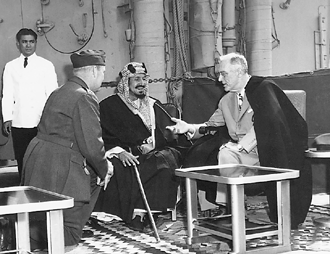That ‘awkward’ but essential relationship between US & Saudi Arabia
Regular as clockwork, every few years, The Economist writes a story about the “awkward” relationship between the United States and Saudi Arabia.
Here’s one from March 2014.
And here’s the most recent story on President Obama’s “swift” trip to Riyadh earlier this week. The entire Western media has assured us that no one was left with a warm and fuzzy feeling after Mr Obama’s April 20th encounter with King Salman. The Economist reported (with faintly malicious glee, it seemed) the statement released after the meeting: “the two leaders were said to have ‘exchanged views’ — diplomatic speak for they didn’t agree on much.”
So what’s new?
They didn’t agree on much even when the alliance was agreed between Franklin Roosevelt and Saudi Arabia’s founding king, Abdulaziz, soon after WWII.
How could it be anything else with two such different countries? Saudi Arabia and the United States are at different ends of the spectrum in temperament, habit, culture and aspiration.
One is a religiously orthodox monarchical family estate; the other a fiercely freedom-loving self-regarding democracy with a clearly advancing (if contentious) socially liberal cultural agenda.
But it was arguably simpler back in 1945, more specifically Valentine’s Day, when King Abdulaziz met FDR on board the US Navy cruiser Quincy in the Great Bitter Lake segment of the Suez Canal.
It was the first face-to-face contact between the ones who really mattered both in Washington, D.C. and Riyadh and the trade-off was simple and straightforward: the US would provide security, the Saudis oil. Both countries were worried about the Reds and were content to stay in touch if not exactly in sync.
But things are very different now.
First, the blowback from 9/11. It has been 15 years in the coming and one does not have to be Saudi (or a Gulf Arab) to wonder why America is so suddenly displaying such revulsion towards (and suspicion) of Riyadh. How much of this is because of the bounty of fracking, America’s reduced reliance on Saudi oil?
This seems an odd moment to be dwelling on the fact that 15 of the 19 hijackers on 9/11 were Saudi. This is a strange disconnected point of time for the US Congress to debate a bill that would allow victims of the attacks to sue the Saudi government and claim damages if it were found by the American courts to be complicit. Why now are so many demanding to see the contents of a secret 28-page section of the official report into the 9/11 attacks? It was withheld on grounds of national security. What has changed for America to want complete disclosure on all sides and of everything?
There is a problem with this sudden American revulsion towards Saudi Arabia. It is ill-timed and imprudent. If anything, the Saudis are now better partners in the so-called war on terror than in 2001.
Fareed Zakaria recently recalled General David Petraeus telling him that “the most significant strategic shift during his time in uniform was that Saudi Arabia went from being a tacit supporter to an aggressive foe of jihadi groups.”
This sounds quite right because the House of Saud is as much in the sights of the jihadi groups as America, the West, Israel, India etc.
As for imprudence, it would be foolish for the US to allow its citizens to claim damages from Saudi Arabia if its courts find the Saudi government complicit. First, can that be proved? If it could, we’d have heard about it by now, make no mistake.
Second, to strip Riyadh of this immunity might turn Washington into a target as well. Consider the lawsuits that citizens of different countries could bring against the US government – civil damage by a drone strike, death of main household provider in a bombing raid.
The best way to view the US-Saudi tie may be The Economist’s perennial terminology in this regard: awkward relations.


